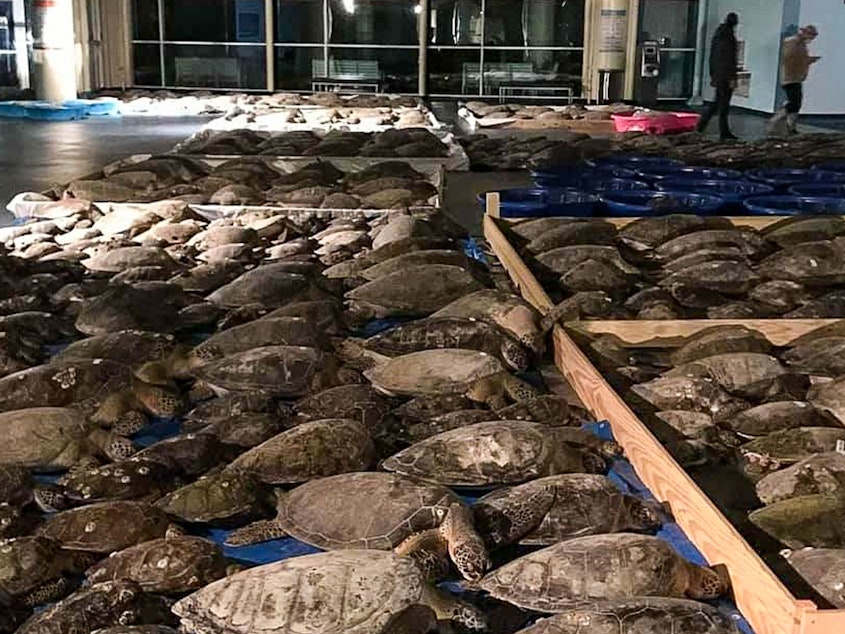Volunteers In Texas Are Saving Thousands Of Cold-Stunned Sea Turtles From The Storm

Volunteers in coastal Texas have rescued thousands of sea turtles from frigid waters and shores during the historic winter storm, and are working creatively to house them as much of the region remains without power.
Sea Turtle, Inc., a non-profit education, rehabilitation and conservation organization in South Padre Island, has taken in nearly 4,500 sea turtles since Sunday, according to executive director Wendy Knight. She told NPR that local volunteers have been retrieving the turtles by boat and on foot, and the organization has been able to accommodate them with assistance from the community including local government and SpaceX, which has a launch site nearby.
"The love and support of people who just want to help things that can't help themselves is overwhelming," Knight said.
As of Wednesday morning, Knight said, the floor of Sea Turtle, Inc.'s facility was covered in bins containing some 500 rescues. The city's convention and visitor's bureau donated the use of the South Padre Island Convention Centre, which Knight said is currently housing the other approximately 4,000 in a combination of tarps, kiddie pools and boxes "lined up tip to toe."
The persistent cold temperatures mean more turtles will likely arrive throughout the day, prompting the need to spill over into a third storage facility, according to Knight. And with more bad weather on the way, she estimates the first turtles ready to return to the water won't be released until Saturday.
Sponsored
The cold-blooded creatures are particularly vulnerable to the extreme weather since they are unable to regulate their own body temperature. When water temperatures drop below approximately 50°F, sea turtles remain awake but lose the ability to move, a condition called a "cold stun" that often leads to death by injury, stranding or drowning.
The five species of sea turtle found in Texas are all considered either threatened or endangered, according to the U.S. Fish & Wildlife Service.
Knight called this week "the Armageddon of all cold stuns," noting that while the group prepares for cold stuns annually, they do not typically expect to be without power at the same time.
"We have exacerbated a once in a few decade experience by a holdback of the power grid and a holdback of our electric support," she said.
The facility is permanently home to five sea turtles which are not fit to be released into the wild (including one with a prosthetic fin), and was also housing some 35 sick or injured turtles when the power went out at 2 a.m. on Sunday, according to Knight. The water in the tanks began to cool, and she said it's been an "uphill battle" trying to keep them alive while waiting for power to be restored.
Sponsored
And that's not including the thousands of turtles that have been rescued since.
Knight estimates that some 2,200 turtles were brought in during the first two days of the storm, mostly by alert community members who went out in their boats — from recreational boats to fishing vessels to dinner cruises — to help pull the island's famous creatures out of the water. The tide has increasingly pushed the turtles ashore, and volunteers are continuing to pick them up and drive them over to the facility in trucks and trailers, she said.
Many of the rescued turtles have been on the larger side, she added — one in particular is 150 years old and about 400 lbs.
The organization, which has some 30 employees and 500 registered volunteers, does outreach and trainings at the start of every cold stun season in which it teaches potential rescuers how to interact with the sea turtles. Knight noted that this season's training had already taken place, albeit virtually due to the pandemic.
Community members have shown their support for the efforts in several other ways. People have offered up their personal generators, and the city council built platforms to store the turtles, Knight said.
Sponsored
Another game-changing development came on Monday night, when officials from SpaceX showed up to deliver the specific and massive model of commercial generator needed to host electrical services for the nonprofit's education center, residence center and clinic and hospital.
Sea Turtle, Inc.'s relationship with the company dates back several years, Knight explained, adding that its Boca Chica launch site is visible from the facility across the skyline. She said the two have collaborated on research and training related to turtle conservation on the beach, and officials from the company reached out on Monday to ask how they could help.
"Like a ray from heaven, yesterday at 7:30 p.m. the site director and operations manager for SpaceX Boca Chica and two electricians and engineers from SpaceX showed up on our property with the largest generator I've ever seen," Knight said. "And at 1:30 a.m. this morning we turned the lights and the power on."
(Trained SpaceX employees have also rescued some 850 of the turtles, Knight said, initially storing them in their gymnasium while coordinating transportation. SpaceX did not respond to a request for comment in time for publication.)
But the cold stun event and power outage continues, and Knight said the process of dealing with it has been "one step forward, four steps back."
Sponsored
While restoring the facility's power, light and heat, the team discovered that the prolonged outage had blown out all of its heaters and chillers. Knight said SpaceX is looking into temporary fixes, and that "Plan F" of their contingency plan involves heating up all of the hospital tanks and moving the resident turtles — between 150 and 300 lbs — into smaller tanks there.
Longer term, she said there will likely be some turtles that are slow or unable to recover from the cold stun. Still, she notes, a mass release of this many turtles, when the conditions are right, will be "unprecedented." [Copyright 2021 NPR]
